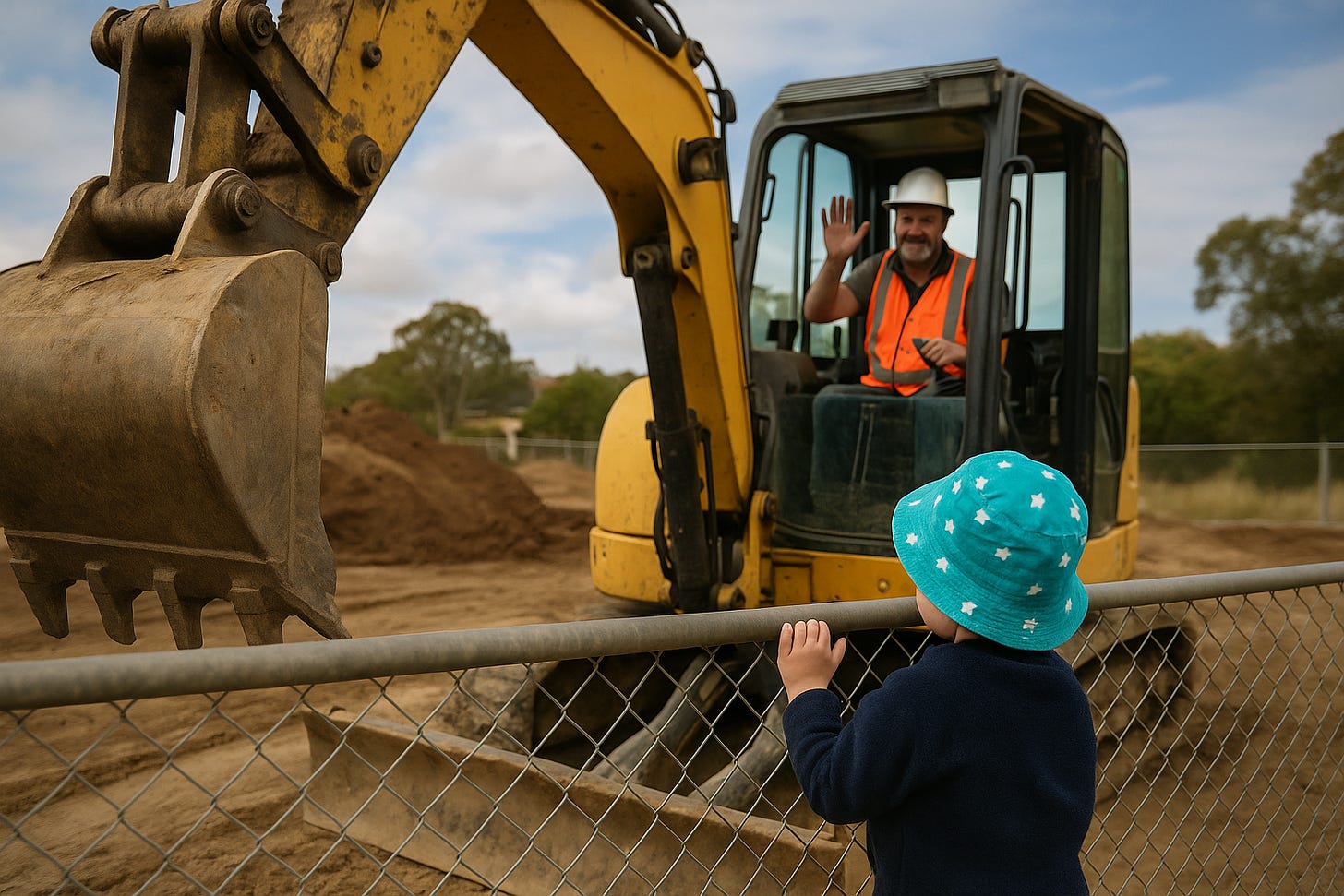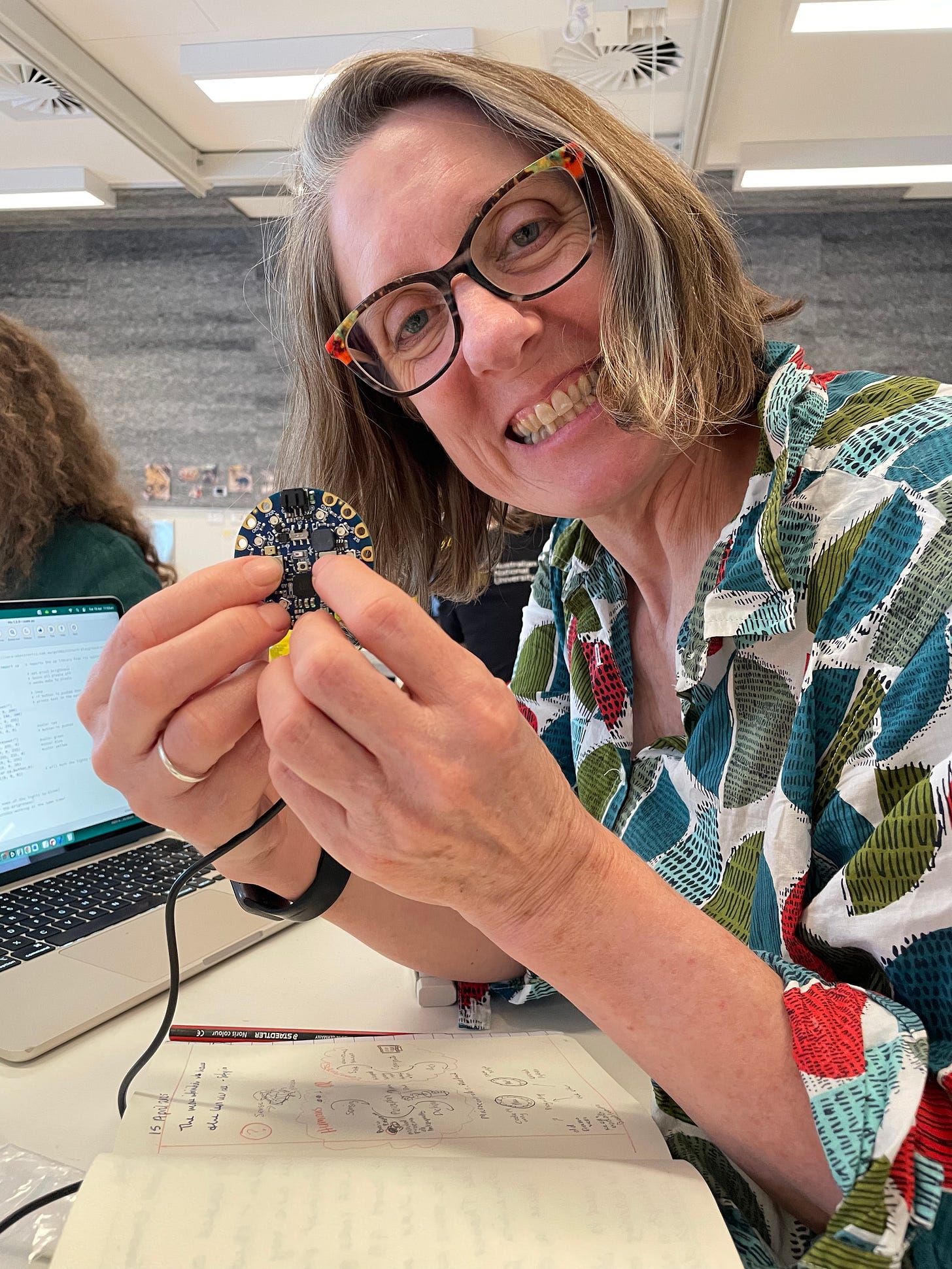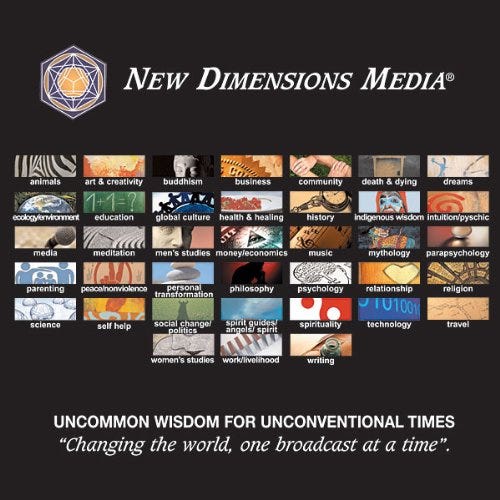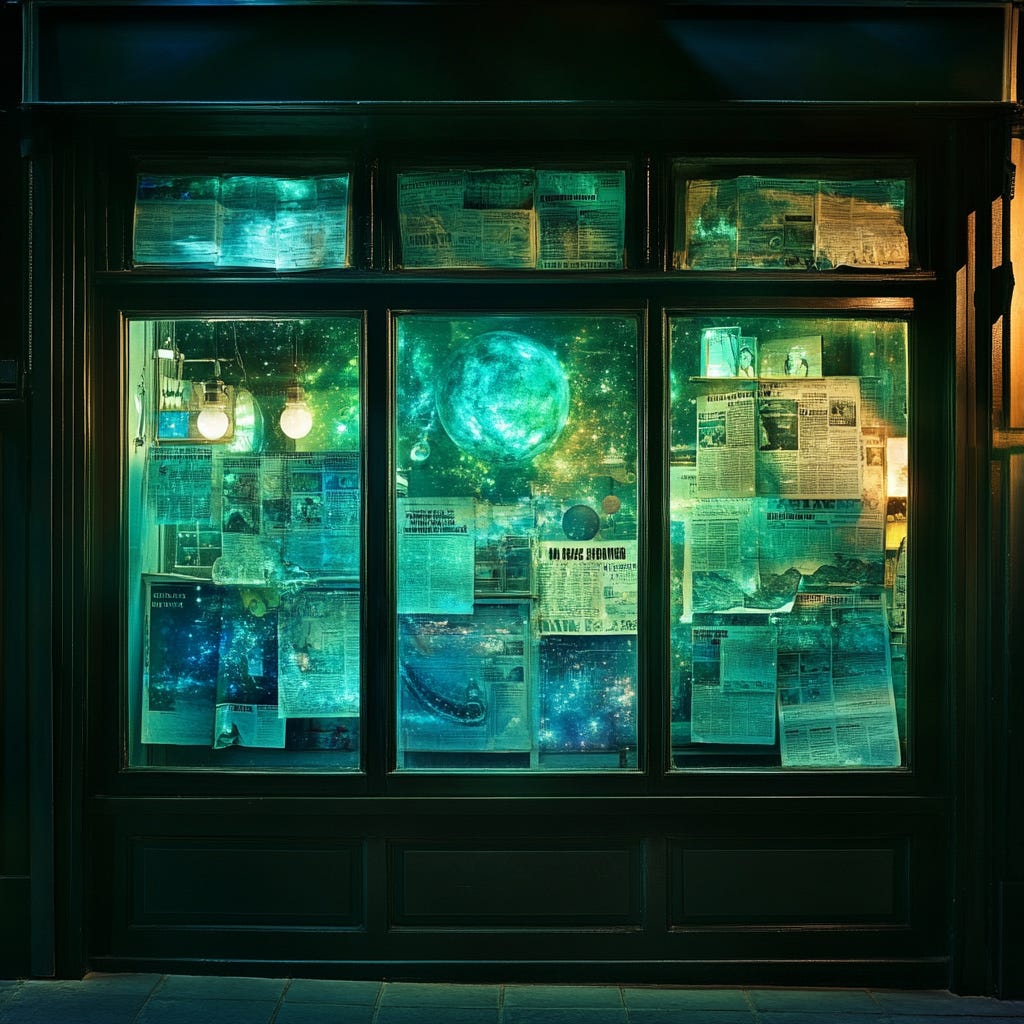29. On the clock: When the digger men wave at toddler, and other living systems
Living systems at work (and as always, something shifting)

Ever noticed how grown-ups sometimes perform for a child?
When I was a parent of a child small enough to push around in a stroller, I one day stopped at a construction site with her to watch the diggers. One by one, each worker noticed this wee thing in a colourful hat and offered a small gesture. One man in fluro sitting within a cabin would raise and lower the front loader comically, another toot tooted a horn, and one man with a shovel simply stopped and waved. This parade of workers, mostly men, continued these warm interactions with my small child. A world of communication and connection I had no idea about, had revealed itself. Showing off, some might say, but for each worker and my child, it was a surprise connection. It continued beyond the construction sites, to fire fighters who let her climb over their trucks, paramedics who allowed her to play with their blue gloves in open ambulances on fair days, and even the actuaries I started my professional career, plopping her on their desk with gold pens and paper, encouraging her to draw pictures of cats and dogs.
I learned that there is a whole world of busy, focused, people in formal employment who will stop for children in ways that are WAY outside their job descriptions. In those moments, politics and division fall away; the clock, even when the boss is around, stops; and grown adult strangers give their time to educating and forming trust bonds with small children.
What I witnessed in those moments wasn’t simply kindness — it was a glimpse of a living system in action. No one was told to wave, toot, or pause. There were no instructions, no policies about how to respond to a child in a starry aqua hat. Something deeper was activated…attention, relationality, responsiveness. Not one-offs at all, but expressions of a system remembering itself — not as a machine of labour or hierarchy, but as a network of human beings, capable of attuning, adapting, and connecting beyond role. That’s what living systems do. They pulse with life, and sometimes, they play. What’s more, in these crazy days, they are still doing it, despite our time clocks, our emails, our distractions, and our efforts to mechanise and reduce every little motion to a metric. And, as a non-religious person, I’m happy to say Alleluia to that!
We get so hung up on formal learning and qualifications. But so much of our sense of the world comes from moments like these — when someone, technically meant to be doing something else, chooses to connect.
Last week I wrote about efficiency of insulating a house compared with the effectiveness of starting again. This week, this emerging generosity of workers towards children gives me a few ideas to share from living systems thinking that you can carry with you — into your work, your home, or your next Zoom call.
In Australia, we have a string of public holidays for the Christian Easter. There will be no digging on constructions sites for four whole days. So I thought maybe you might enjoy some diversions of another living systems style. Here are three good separate hours of ideas to consider about our world systems and our futures, regeneratively.
🌱 Transition “What living systems ask of us”
I learned last week from this podcast that Fritjof Capra in 1997, at the same time my daughter was a babe in a pram, was keen for us to use systems thinking from childhood. A physicist and systems theorist, Capra is a founding director of the Center for Ecoliteracy in Berkeley, California. He walks us through the history of systems thinking, Gaia theory and Cybernetics and gives us new ideas on how to change our technology and ways of doing business.
He talks about the importance of introducing children to living systems thinking early, though growing gardens at school. It was a novel concept at the time, and now in place in many schools, worldwide.
"Success and survival in the 21st century will depend on ecological awareness—not more information." Fritjof Capra
We are a quarter of the way through that century right now.
He advises us to move from the “information era” and data overload to interconnection, from individual achievement to a sustainable community.
Capra Also emphasises creativity as the main force of evolution, so much so he has a mathematical explanation for this - which he promises not to bog us down with - but it is enough to know it exists.
The audio book is in interview form, and only goes for an hour. It’s a fascinating listen, not at all hard. I ‘read’ it on a walk → Explore the book on New Dimensions Foundation.
🌱 Rethinking value in a living economy : John Fullerton
Global finances, economics are something of a strange pseudo-science to all but its practitioners. (As a Cybernetics student I need to be careful not to throw stones here.) However, in this conversation John Fullerton, ex-wall street executive, discusses with Nate Hagens how our economic system, which is designed to maximise financial capital, is maintaining our world-wide destructive thinking and being. And gee, is our economic system overdue for examination. Fullerton proposes a shift toward regenerative economics, early days in conception, where wealth is viewed holistically, integrating natural, social, cultural, and human capital.
He does this by sharing stories of his time working for major corporates and managing the accounts of billionaires. He becomes aware through having his own family that he wants to leave a future for his children, and in understanding the global economic systems first hand and deeply, he is so deeply troubled that he leaves his role and starts to think about what a different system might look like. One that doesn’t undermine the future safety and security of the earth. He proposes we move from reductionist thinking, where we trade value, to systemic thinking, which aligns economies with the principles of living systems. He challenges the 'myth of separation' that underpins many of our economic crises and asks how we might design monetary systems that actually serves life.
Fullerton also urges us to learn the difference between the financial economy and the real economy—and to recognise what genuinely contributes to human and planetary well-being. It made me consider the years spent raising my child with those wonderful workers tipping their hats, and later the many long hours driving an ambulance, patching people or holding the hand of someone dying as a volunteer — none of which is valued in economic terms. And it’s impossible for governments to prioritise this in non-economic terms. This is, however, our real economy. I know you too may have worked in areas you’ve not been paid for. What is the real economy here?
None of what Fullerton says is to guilt trip anyone. While the global investment area might be hard to imagine, he helped me understand that the destructive activity applies greatly to trade of stocks, crude oil or weapons. He said we might be worried about the ecological cost of AI, but no one is really complaining about the cost and damage of the financial system, despite it being a major system for humanity.
I am in a new house, with new rhythms and routines. Hence why I’m discovering and now sharing some things for you to listen to. Capra on Living Systems, and Fullerton on regenerative economies really set me up well for this next one. Hold onto your hats!
🧬Radio»TV»Internet»Social Media»AI» ?
K Allado-McDowell at the Long Now Foundation
The Long Now Foundation talks continually inspire and lean into exactly what Gen2200 is about - except writ large! They think not in 200 years, but 10,000 years!
Are you tired of poor AI writing? I’ve long been wondering how we might deal with this AI slop and techno-noise. Is there value? Why do we have it?And, what choices can we actually make, when we do love a cat video.
In this talk, K Allado-McDowell’s vision of “neural media” feels both strange and oddly practically grounding. Beginning with a trippy AI-generated squirrel image gone viral and culminating in operas, novels, and their collaboration with GPT-3, Allado-McDowell steps us clearly through a recent history of media into an entirely new paradigm: one in which generative media reshapes how we create, relate, and imagine.
Allado-McDowell questions what becomes of the data collected of us, and how it might turn us from something that we track, into something that is tracked, and embedded. Allado-McDowell wonders if humans might move past thinking we are the centre of the universe when we are actually surrounded by different kinds of intelligences - animal and otherwise - and different futures. Cat videos anyone?
Their talk offers both critique and optimism of AI and digital technology. As with their book Pharmako-AI, the point isn’t to run from these strange new technologies, but to instead work with them. Pharmakon means both poison and cure.
I see this as a way for us to work with AI. You and I have very little power to make AI go away. It’s been around since before I was born to start with, and possibly you too. So we need to know the technology around us, then we can start making better choices with how we use it. Maybe find a way for it to be more a cure, than a poison.
🤝 Not Lost In Transition… Something New is Emerging
We can go so much further, together. Collaborating, learning and sharing is one of the best ways to work in consideration of future generations. Lucky for me, I have all you, my beautiful network of colleagues, friends and readers.
However, behind the scenes, something exciting is beginning to take shape. I have an opportunity to collaborate with a special like-minded human on PLANET.
You may have come across my PLANET framework before (or even PILOT before that). PLANET is a holistic framework I created for working with AI. It stands for People, Language, Agency, Need, Environment, and Technique. Every word contains an e for ethics. Inside each word is a special set of considerations. Each letter opens up a constellation of questions — grounded in living systems thinking, ethics of care, and real-world AI experience. PLANET is now ready to be tested more widely.
PLANET = People, Language, Agency, Need, Environment and Technique — with ethics embedded throughout.
PLANET is not just another acronym for the wild and woolly world at large, it is a way in and around our new lives with AI. It’s a “regenerative prompting and systems-thinking” tool. In this new collaboration, we’ll be building further into something that you can use in many different ways.
My (yet to be revealled) collaborator’s work and values are very aligned with Gen2200’s mission— the perfect match to help bring PLANET further into the world to support real people, businesses, and communities. As we start working out loud into the world, we will have the unique chance to help embed holistic values and principles into the way we think about using technology. It’s pretty cool, I can hardly contain myself. (Sit still, Jax!)
Watch this space. The full PLANET launch is coming very soon.
In the meantime, keep exploring. Keep playing. That’s how (in this crazy world) we learn, grow and thrive. Remember that, in relation to our actual PLANET, we only have one of them.
Saying Goodbye on the Full Moon

I want to pause for a moment to share with you that it’s been almost a year since I farewelled my mother, Pat. That night, my family and I were together in place for the last time. Afterward, after 2am, I walked alone from the hospital back to my accommodation under a sky of ice-crystal stars. The moon was full.
My mother often walked home from that same hospital. She was a vibrant, strong practical nurse educator and community nurse. In my eyes, and many who knew here, there was little she couldn’t do.
As I walked that night, I was also accompanied by my 15-year-old self—the girl who used to sneak out at night to avoid mental anguish, walking until dawn to stay safe. That walk held both grief and clarity for me. I felt my mother’s spirit around me, walking beside me too. That night held memory, moonlight, my mum and I over many decades, and some kind of resolve and peace.
Some of you have commented that I’ve been a little slower out the gate of late. This is due to the intensity of my studies and moving house. While these posts have been weekly for six month (nearly 30 issues!), I was thinking recently about what kind of cadence I wanted to maintain. My mother would have said, “Well, just say what you’ll do and do it”. So to honour this, I decided on monthly posts … out on the full moon (do not howl!!).
Monthly feels more spacious. It gives me time to go deeper, and it gives you space to breathe between issues. In between, I’ll still share regularly snippets from life, moments on nature-inspired thinking, intergenerational learning. I’ll look for the intersection with technology and tools, which I understand we can’t be easily separated from, but need to learn to use with care. I might even learn how to use Substack’s notes.
Our lives are affected by global chaos, which is devastating for many. However through this chaos may come an opportunity to grow the world we want. In between the monthly posts will be field notes or fragments as things emerge - I aim for these to be like hardy weeds of hope through the ugly concrete of our cities. Things that makes sense, or just make us smile.
In making these changes I’ve looked back, as I do.
It’s been 29 steps to get us from The Case for Quiet mid-last year to now.
I’ve aimed over six months to use everyday moments to explore big living systems and intergenerational thinking ideas organically. Lemons. Rivers. Crises. Frogs. Tech. Kin. AI. Grief.
Gen2200 began as a vague concept and has become a living movement—something I’ve heard you draw on in your own aim to become a better ancestor in the now.
Today’s post has taken weeks to write and re-write. However many readers have joined me along the the whole river-side bush walk, from Bow-ties to butterflies (morphed learning from emergency management and dealing with crisis), to Dear Julia…(sharing how doubt and constriction have followed me, just like you and everyone else we know), to now, where we are exploring living systems together for better futures, is a big leap. Let’s keep leaping!
🌱 Where we’ve been
If you’re new here, this guide gives you a few gentle ways in.
Or you might like to dip into:
The case for quiet is strong – where the tone began
Curious about Gen2200 – my first mapping of the idea
Unknotting life’s crises by taking the butterfly road – metaphors that carry
The intention of ‘Attention’ – where noticing becomes systems work
Cyborgs, Futures and the Machine That Helps Us Imagine – from speculation to tool-making
Counting the Rings – the most recent: tree rings, seasons, slow-tech, story
💬 I checked back over the past 28 editions and re-read what you’ve said. Here is a quick reminder.
“This helped me understand one of my children better. I loved how you incorporated AI to visually demonstrate the fluidity of who you are.” — Alice
“Your reflections give me hope. And a bit of excitement.” — Julianne
“Curiosity over fear—maybe that’s an aspirational objective for all of us.” — Michelle
“Your post has me asking what the impact could be in seven generations. I should think long term because that’s where hope and optimism come from.” — Michelle, again
“The 'This, Not That' framework is a goody! I use it a lot. Clarifies.” — Meredith
“I forgot how much could be fit into a day.” — Annie
“Thank you for sending me back to the place where I healed.” — Roger
“Gentle means reorganising my life around what’s important.” — Kathryn
“What a beautiful way to celebrate... without apology.” — Christina
THANK YOU! I would not still be doing this, if I did not know anyone was reading. Your “hearts”, your re-stacks and shares help me go on and go further. Because of you, Gen2200 feels less a monologue and more like a conversation now. Thank you. If you’ve been sitting with any thoughts of this and haven’t shared yet, I’d love to hear from you. Whether it’s a quote, a question, or a quiet recognition—every trace of reflection adds to the living archive we’re building.
I heard from a few of you in the past two weeks wondering when this next issues was coming. Here it is - perfect for a long weekend Easter read. I have been snowed in uni work and, as mentioned, kept writing and re-writing. That reminds me…
Gen2200 is still evolving. It’s a system, not a slogan. And you’ve been part of that evolution, whether quietly reading, replying, or just letting something sit with you longer than expected.All of this helps keep this system going.
See you at the next moon. Until then — stay curious, stay kind, and keep noticing the systems pulsing with life all around you.
—Jax

🌱Your turn
Where are the living systems in your life showing up lately — and what might they be asking of you?
Have you witnessed a moment of surprising connection or collective intelligence recently?
Tried using a Gen2200 or PLANET idea in your work or thinking? I’d love to know what happened.
Found a phrase or idea in this post that’s sticking with you? Hit reply — or re-stack with a note. Every response adds to the conversation. Every shared moment is another root in this growing system.
📢 Want more?
📖 More Jax insights on Medium and LinkedIn
📸 My photos— Flickr



"Just a song before I go, a lesson to be learned" .... I really like what you have created in Gen2200. I find it a place regardless of topic where I can move and think slower. It is a sumptuous feast for the brain...."traveling twice the speed of sound,it's easy to get burned". CSN 1977